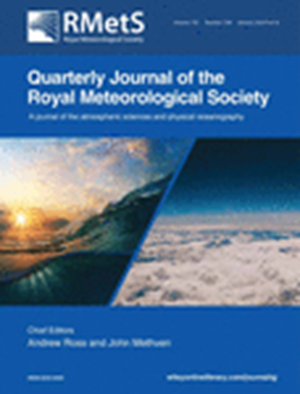英国平均风和极端风的季节性预测
IF 3
3区 地球科学
Q2 METEOROLOGY & ATMOSPHERIC SCIENCES
引用次数: 0
摘要
最近的研究表明,季节性预报系统在预测北欧冬季的风和风暴方面具有重要的技能,但其他季节还没有得到如此广泛的分析。鉴于这一事实,再加上英国气象局用户对英国3个月前景的要求,我们使用英国气象局的季节性预测系统GloSea的大型集合,研究了在一年中预测季节性(3个月)平均英国风速和风暴(极端风)的技巧。我们发现,英国季节性风暴和平均风速之间有很好的相关性,因此,对英国平均风速的单一预测将表明预测的风暴数量。这些预测的技巧在冬季(12月至2月)最高,这与北大西洋振荡的可预测性有关。相比之下,英国夏季(6月至8月)的风力并不显著,而且似乎是负面的。我们在观测和模型成员中都发现了来自热带的罗斯比波影响英国夏季风的证据,并在模型集合平均值中形成了一个重要的可预测分量。然而,模型可预测的信号似乎与观察到的信号异相,从而导致负相关性。有必要对夏季Rossby波的产生和传播进行进一步调查,以了解夏季预测是否可以改进。这篇文章受版权保护。保留所有权利。本文章由计算机程序翻译,如有差异,请以英文原文为准。
Seasonal prediction of UK mean and extreme winds
Recent studies have shown that seasonal forecasting systems have significant skill in predicting Northern European winds and storms in winter, but other seasons have not been so extensively analysed. Given this fact, and coupled with requests from users of the Met Office 3‐month outlook for the UK, we have investigated the skill in predicting seasonal (3‐month) mean UK wind speed and storms (extreme winds) with a one‐month lead‐time, throughout the year, using a large ensemble from the Met Office's seasonal prediction system, GloSea. We find that seasonal UK storms and mean wind speeds are well correlated, and therefore a single prediction of UK mean wind speed will give an indication of predicted storm counts. Skill for these predictions is highest in winter (December–February), related to predictability of the North Atlantic oscillation. In contrast, summer (June–August) UK wind skill is not significant and furthermore appears to be negative. We find evidence, in both observations and model members, for a Rossby wave from the tropics influencing UK summer winds and forming a significant predictable component in the model ensemble mean. However, the model predictable signal appears to be out of phase with that observed leading to the negative correlation. Further investigation into summer Rossby wave generation and propagation is necessary to understand whether summer predictions could be improved.This article is protected by copyright. All rights reserved.
求助全文
通过发布文献求助,成功后即可免费获取论文全文。
去求助
来源期刊
CiteScore
16.80
自引率
4.50%
发文量
163
审稿时长
3-8 weeks
期刊介绍:
The Quarterly Journal of the Royal Meteorological Society is a journal published by the Royal Meteorological Society. It aims to communicate and document new research in the atmospheric sciences and related fields. The journal is considered one of the leading publications in meteorology worldwide. It accepts articles, comprehensive review articles, and comments on published papers. It is published eight times a year, with additional special issues.
The Quarterly Journal has a wide readership of scientists in the atmospheric and related fields. It is indexed and abstracted in various databases, including Advanced Polymers Abstracts, Agricultural Engineering Abstracts, CAB Abstracts, CABDirect, COMPENDEX, CSA Civil Engineering Abstracts, Earthquake Engineering Abstracts, Engineered Materials Abstracts, Science Citation Index, SCOPUS, Web of Science, and more.

 求助内容:
求助内容: 应助结果提醒方式:
应助结果提醒方式:


